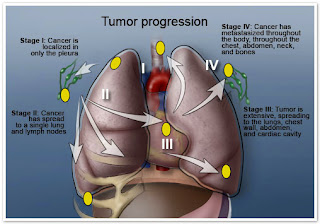Mesothelioma Stages
How is mesothelioma staged?
Mesothelioma stages are the assessment levels that doctors utilize to determine the extent of the cancer within the body. Mesothelioma is staged between 1 and 4, depending on severity. Stage 1 mesothelioma, for instance, is highly localized disease, with the tumor affecting only a limited area and organ tissue. Stage 4 cancer, on the other extreme, is extensive disease, which has spread far beyond the tumor’s origin, affecting other organ tissue and even blood or bone cells.
Given how rare mesothelioma is, a formal staging classification exists only for pleural mesothelioma, which affects the lining of the lung and chest cavity. Staging is determined at diagnosis, using any number of diagnostic procedures. Basic staging can be determined through the use of imaging scans, which will provide cancer specialists a visual representation of the extent of the tumor within the body. If the results of imaging scans are inconclusive or it appears that the disease is not localized, a physician may request the patient to undergo a needle or surgical biopsy, which can determine if the malignant cells have metastasized to the blood or lymph nodes through laboratory testing.
Mesothelioma Staging Systems
Today, there are three primary staging systems used to assess how far mesothelioma cancer has spread and each system uses four stages to describe the progression of the disease. It is the definition of each stage within the various systems that can vary slightly.
Butchart Staging System
The Butchart staging system is the oldest and most commonly utilized staging system for mesothelioma. This system is focused on defining the location of the primary tumor mass in the body for each stage. The system doesn’t address how many cancer cells are present, how big the tumor is or the level of cancer present in the body overall.
TNM Staging System
The TNM Staging System, developed by the American Joint Committee on Cancer (AJCC), is similar to staging systems used for other types of cancer. It considers the characteristics of the tumor (T), whether or not lymph nodes are involved (N) and if the cancer has metastasized to other locations in the body (M).
Brigham Staging System
The Brigham Staging System also has four stages of progression and is very similar to the TNM Staging System. The primary difference between the two is that in addition to defining the location of the tumor, and assessing lymph node involvement and the presence of metastatic disease, the Brigham System also helps assess the possibility for and effectiveness of surgical intervention at each stage.
The Stages of Mesothelioma
The four stages of mesothelioma, as noted above, vary slightly within each system but can be generally characterized as indicated below. Please click into the individual pages to get more information about each stage in general and as is it defined within each staging system:
Stage 1 Mesothelioma
In Stage 1 the tumor is localized, there is no lymph node involvement, and the cancer has not spread to other organs or tissues. In this case, the cancer is likely restricted to one side of the pleura and surgical removal is typically feasible.
Stage 2 Mesothelioma
In Stage 2, the tumor is larger and has invaded the lung or diaphragm. Lymph nodes may also be involved. In this case, surgical resection may be possible though the cancer has likely spread to both sides of the pleura.
Stage 3 Mesothelioma
In Stage 3, mesothelioma has invaded a single region or area such as the chest wall, esophagus, and/or lymph nodes, and surgical resection is generally ruled out as a potential beneficial treatment.
Stage 4 Mesothelioma
In Stage 4, mesothelioma has invaded multiple regions such as different areas of the chest wall, the diaphragm and/or the pericardium. Lymph nodes are also involved and the cancer has spread to other organs. Surgical removal provides no value in this case as the disease has likely metastasized well beyond its origin.
Source: http://www.mesothelioma.com/mesothelioma/stages/










